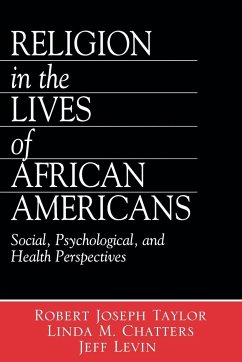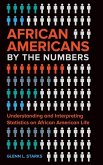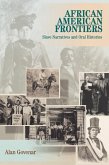Robert Joseph Taylor, Linda M. Chatters, Jeff Levin
Religion in the Lives of African Americans
Social, Psychological, and Health Perspectives
Schade – dieser Artikel ist leider ausverkauft. Sobald wir wissen, ob und wann der Artikel wieder verfügbar ist, informieren wir Sie an dieser Stelle.
Robert Joseph Taylor, Linda M. Chatters, Jeff Levin
Religion in the Lives of African Americans
Social, Psychological, and Health Perspectives
- Broschiertes Buch
- Merkliste
- Auf die Merkliste
- Bewerten Bewerten
- Teilen
- Produkt teilen
- Produkterinnerung
- Produkterinnerung
Deriving conclusions from the National Survey of Black Americans and several additional wide-ranging surveys, Religion in the Lives of African Americans examines broad issues: patterns of religious involvement; the functions of religion in coping, social support, etc.; and the relationships between religion and physical and mental health and well-being. Since the early 1900s, there has been ongoing academic interest in the nature, patterns, and functions of religion in the lives of African Americans because of the pervasiveness and persistence of the religious context in the lives of…mehr
Andere Kunden interessierten sich auch für
![African Americans by the Numbers African Americans by the Numbers]() Glenn StarksAfrican Americans by the Numbers53,99 €
Glenn StarksAfrican Americans by the Numbers53,99 €![African Americans and American Indians in the Revolutionary War African Americans and American Indians in the Revolutionary War]() Jack Darrell CrowderAfrican Americans and American Indians in the Revolutionary War45,99 €
Jack Darrell CrowderAfrican Americans and American Indians in the Revolutionary War45,99 €![The Inventive Spirit of African Americans The Inventive Spirit of African Americans]() Patricia SlubyThe Inventive Spirit of African Americans37,99 €
Patricia SlubyThe Inventive Spirit of African Americans37,99 €![African Americans in the West African Americans in the West]() Douglas FlammingAfrican Americans in the West78,99 €
Douglas FlammingAfrican Americans in the West78,99 €![The Inventive Spirit of African Americans The Inventive Spirit of African Americans]() Patricia Carter SlubyThe Inventive Spirit of African Americans55,99 €
Patricia Carter SlubyThe Inventive Spirit of African Americans55,99 €![Killing of African-Americans by Racist Cops Killing of African-Americans by Racist Cops]() Msp John OsomKilling of African-Americans by Racist Cops16,99 €
Msp John OsomKilling of African-Americans by Racist Cops16,99 €![African Americans Frontiers African Americans Frontiers]() Alan B. GovenarAfrican Americans Frontiers84,99 €
Alan B. GovenarAfrican Americans Frontiers84,99 €
Deriving conclusions from the National Survey of Black Americans and several additional wide-ranging surveys, Religion in the Lives of African Americans examines broad issues: patterns of religious involvement; the functions of religion in coping, social support, etc.; and the relationships between religion and physical and mental health and well-being. Since the early 1900s, there has been ongoing academic interest in the nature, patterns, and functions of religion in the lives of African Americans because of the pervasiveness and persistence of the religious context in the lives of individuals, families and communities for this population group. This book enhances and furthers such academic interest by presenting a comprehensive, integrated analysis based upon rigorous, systematic survey research. The authors provide readers with an authoritative profile of the importance of religious involvement in relation to diverse forms of behaviours, attitudes and perceptions.
Produktdetails
- Produktdetails
- Verlag: Sage Publications
- Seitenzahl: 320
- Erscheinungstermin: 19. August 2003
- Englisch
- Abmessung: 229mm x 152mm x 17mm
- Gewicht: 466g
- ISBN-13: 9780761917090
- ISBN-10: 0761917098
- Artikelnr.: 21089090
- Herstellerkennzeichnung
- Libri GmbH
- Europaallee 1
- 36244 Bad Hersfeld
- gpsr@libri.de
- Verlag: Sage Publications
- Seitenzahl: 320
- Erscheinungstermin: 19. August 2003
- Englisch
- Abmessung: 229mm x 152mm x 17mm
- Gewicht: 466g
- ISBN-13: 9780761917090
- ISBN-10: 0761917098
- Artikelnr.: 21089090
- Herstellerkennzeichnung
- Libri GmbH
- Europaallee 1
- 36244 Bad Hersfeld
- gpsr@libri.de
Robert Joseph Taylor, MSW, Ph.D., is the Sheila Feld Collegiate Professor of Social Work and the Associate Dean for Social Work Research at the University of Michigan. He is a Faculty Associate with the Program for Research on Black Americans at the Institute for Social Research. He is also a faculty associate with the Center for Afro-American and African Studies and affiliated with the Center for Research on Race, Religion and Health at the Institute for Social Research. He is currently on the editorial board of the Journal of Marriage and the Family. Professor Taylor has published extensively in two major areas (informal social support networks and religious participation). His work on the informal networks investigates the role of family, friends, and church members as sources of social support to adult and elderly Black Americans. His work in the Sociology of Religion investigates the demographic correlates of religious participation among black adults and black elderly. He has been Principal Investigator of several grants from the National Institute on Aging which examine the role of religion in the lives of Black and White elderly adults. He has been Co-Principal Investigator with James Jackson on several grants from the National Institute of Mental Health on the correlates of mental health and mental illness among black Americans. He is Co-Principal Investigator for the National Institute on Aging grant, "Church-based Assistance and Older Blacks." He has edited two books Family Life in Black America (1997) and Aging in Black America (1993) with James S. Jackson and Linda M. Chatters.
Foreword - James S. Jackson
Acknowledgments
1. Introduction
Goals for the Book
Data Sources
Format and Scope of the Volume
Part I: Patterns of Religion
2. African American Religious Participation
Overview of Chapter
The Interface Between Religiosity and Spirituality
Models of Religious Involvement in Black Churches
Socio-Historical Role of the Church
Religious Denomination
Denominational Switching
Generational Differences in Religious Denomination
Conceptualization and Measurement of Religious Involvement
Structural Determinants of Religious Involvement
Profile of Religious Participation
Black-White Differences
Gender Differences
Age Differences
Marital Status Differences
Education and Income Differences
Regional and Urban-Rural Differences
Denominational Differences in Religious Participation
Physical Health Differences
Religious Participation Among Elderly Blacks
Religious Participation Among Blacks Adolescents
Religious Noninvolvement
Religious Artifacts
Religious Identity
Focus Group Findings
Prayer
Reading Religious Materials
Religious Programming
Meditation
Religious Participation in the Context of Work
Living in a Christ-Like Manner
Volunteerism as a Form of Religious Participation
Organized Religious Activities
Focus Group Summary
Chapter Summary and Conclusion
3. The Frequency and Importance of Prayer
Research on Prayer
Research on Prayer Among Black Americans
Requests for Prayer
Focus Group Findings
Communication and Relationship With God
God as Best Friend
Meditation and Prayer
Prayers of Thanksgiving
Prayers of Petition
Prayer as Intercession
Writing Down One¿s Prayers
The Importance of Prayer
The Power of Prayer
Focus Group Summary
Chapter Summary and Conclusion
Part II: Functions of Religion
4. Prayer as a Source of Coping
Coping With Personal Problems
Prayer and Coping With Life Problems
Religious Coping and Caregiving
Religious Coping and Health and Illness
Harmful Effects of Religious Coping
Prayer and Coping Among Black Americans
Focus Group Findings
Prayer Is an Ongoing Coping Activity
Interpersonal Conflicts on the Job
Prayer Gives Strength, Wisdom, and Guidance
Prayer Reduces Stress
Spiritual Component of Prayer
Loving Your Enemies/Forgiveness
Power of Prayer
Focus Group Summary
Chapter Summary and Conclusion
5. Use of Ministers for Personal Problems
Clergy and Formal Support Systems
Clergy as a Coping Resource
Survey Data on the Use of Ministers
Focus Group Findings
Patterns and Circumstances of Using Ministers
Deciding to Forgo Clergy Help
Choosing to Disclose Difficult Problems
Focus Group Summary
Chapter Summary and Conclusion
6. Church Members as a Source of Social Support
Church-Based Informal Social Support
Family and Church Support
Profile of the Receipt of Support From Church Members
Focus Group Findings
Church Members Provide Instrumental and Emotional Support
Importance of Building Relationships With Church Members
Importance of Having Church Members Provide Support
Similarity Between Church Members and Family Members
Formal Programs in the Church
Reciprocal Relationships
Giving Help to Church Members
Difficulty in Giving and Receiving Help
Focus Group Summary
Chapter Summary and Conclusion
7. Negative Interaction Among Church Members
Research on Negative Interaction
Negative Interaction Among African Americans
Negative Interaction Among Church Members
Survey Findings on Negative Interaction Among Church Members
Focus Group Findings
Church Members, Like Family Members, Have Conflict
Gossip
Avoiding Gossip
Generational Differences
Conflict Over Special Programs and Board Meetings
Losing Church Members Because of Conflict
Avoiding Conflict
Feeling Unwelcome
Helping People Feel Welcome
Other Concerns
Problems in Church Do Not Inhibit Attendance and Participation
Focus Group Summary
Chapter Summary and Conclusion
Part III: Effects of Religion
8. Impact of Religion on Physical Health
Research on Religion and Health
Religion and Health in African Americans
Religion and Morbidity in Study Samples of Whites and Blacks
Religion and Morbidity in African American Study Samples
Religion and Mortality in African Americans
Religion, Race, and Health: Theoretical Considerations
9. Impact of Religion on Mental Health and Well-Being
Religion and Mental Health: Clinical and Population-Based Research
Religion, Aging, and Psychological Well-Being
Religion, Mental Health, and Well-Being in African Americans
Studies in Which Effects of Race Are Controlled
Religion and Mental-Health Outcomes
Religion and Psychological Well-Being
Studies That Investigate Racial Differences
African American Study Samples
Religion and Depressive Symptoms
Religion and Positive Well-Being
Religion, Race, and Mental Health: Directions for Future Research
10. Conclusions and Implications
Chapter Review and Implications
Current Research Projects
Appendix A: Data Sources
Appendix B: Multivariate Tables
Recommended Reading and Resource Guide
References
Author Index
Subject Index
About the Authors
Acknowledgments
1. Introduction
Goals for the Book
Data Sources
Format and Scope of the Volume
Part I: Patterns of Religion
2. African American Religious Participation
Overview of Chapter
The Interface Between Religiosity and Spirituality
Models of Religious Involvement in Black Churches
Socio-Historical Role of the Church
Religious Denomination
Denominational Switching
Generational Differences in Religious Denomination
Conceptualization and Measurement of Religious Involvement
Structural Determinants of Religious Involvement
Profile of Religious Participation
Black-White Differences
Gender Differences
Age Differences
Marital Status Differences
Education and Income Differences
Regional and Urban-Rural Differences
Denominational Differences in Religious Participation
Physical Health Differences
Religious Participation Among Elderly Blacks
Religious Participation Among Blacks Adolescents
Religious Noninvolvement
Religious Artifacts
Religious Identity
Focus Group Findings
Prayer
Reading Religious Materials
Religious Programming
Meditation
Religious Participation in the Context of Work
Living in a Christ-Like Manner
Volunteerism as a Form of Religious Participation
Organized Religious Activities
Focus Group Summary
Chapter Summary and Conclusion
3. The Frequency and Importance of Prayer
Research on Prayer
Research on Prayer Among Black Americans
Requests for Prayer
Focus Group Findings
Communication and Relationship With God
God as Best Friend
Meditation and Prayer
Prayers of Thanksgiving
Prayers of Petition
Prayer as Intercession
Writing Down One¿s Prayers
The Importance of Prayer
The Power of Prayer
Focus Group Summary
Chapter Summary and Conclusion
Part II: Functions of Religion
4. Prayer as a Source of Coping
Coping With Personal Problems
Prayer and Coping With Life Problems
Religious Coping and Caregiving
Religious Coping and Health and Illness
Harmful Effects of Religious Coping
Prayer and Coping Among Black Americans
Focus Group Findings
Prayer Is an Ongoing Coping Activity
Interpersonal Conflicts on the Job
Prayer Gives Strength, Wisdom, and Guidance
Prayer Reduces Stress
Spiritual Component of Prayer
Loving Your Enemies/Forgiveness
Power of Prayer
Focus Group Summary
Chapter Summary and Conclusion
5. Use of Ministers for Personal Problems
Clergy and Formal Support Systems
Clergy as a Coping Resource
Survey Data on the Use of Ministers
Focus Group Findings
Patterns and Circumstances of Using Ministers
Deciding to Forgo Clergy Help
Choosing to Disclose Difficult Problems
Focus Group Summary
Chapter Summary and Conclusion
6. Church Members as a Source of Social Support
Church-Based Informal Social Support
Family and Church Support
Profile of the Receipt of Support From Church Members
Focus Group Findings
Church Members Provide Instrumental and Emotional Support
Importance of Building Relationships With Church Members
Importance of Having Church Members Provide Support
Similarity Between Church Members and Family Members
Formal Programs in the Church
Reciprocal Relationships
Giving Help to Church Members
Difficulty in Giving and Receiving Help
Focus Group Summary
Chapter Summary and Conclusion
7. Negative Interaction Among Church Members
Research on Negative Interaction
Negative Interaction Among African Americans
Negative Interaction Among Church Members
Survey Findings on Negative Interaction Among Church Members
Focus Group Findings
Church Members, Like Family Members, Have Conflict
Gossip
Avoiding Gossip
Generational Differences
Conflict Over Special Programs and Board Meetings
Losing Church Members Because of Conflict
Avoiding Conflict
Feeling Unwelcome
Helping People Feel Welcome
Other Concerns
Problems in Church Do Not Inhibit Attendance and Participation
Focus Group Summary
Chapter Summary and Conclusion
Part III: Effects of Religion
8. Impact of Religion on Physical Health
Research on Religion and Health
Religion and Health in African Americans
Religion and Morbidity in Study Samples of Whites and Blacks
Religion and Morbidity in African American Study Samples
Religion and Mortality in African Americans
Religion, Race, and Health: Theoretical Considerations
9. Impact of Religion on Mental Health and Well-Being
Religion and Mental Health: Clinical and Population-Based Research
Religion, Aging, and Psychological Well-Being
Religion, Mental Health, and Well-Being in African Americans
Studies in Which Effects of Race Are Controlled
Religion and Mental-Health Outcomes
Religion and Psychological Well-Being
Studies That Investigate Racial Differences
African American Study Samples
Religion and Depressive Symptoms
Religion and Positive Well-Being
Religion, Race, and Mental Health: Directions for Future Research
10. Conclusions and Implications
Chapter Review and Implications
Current Research Projects
Appendix A: Data Sources
Appendix B: Multivariate Tables
Recommended Reading and Resource Guide
References
Author Index
Subject Index
About the Authors
Foreword - James S. Jackson
Acknowledgments
1. Introduction
Goals for the Book
Data Sources
Format and Scope of the Volume
Part I: Patterns of Religion
2. African American Religious Participation
Overview of Chapter
The Interface Between Religiosity and Spirituality
Models of Religious Involvement in Black Churches
Socio-Historical Role of the Church
Religious Denomination
Denominational Switching
Generational Differences in Religious Denomination
Conceptualization and Measurement of Religious Involvement
Structural Determinants of Religious Involvement
Profile of Religious Participation
Black-White Differences
Gender Differences
Age Differences
Marital Status Differences
Education and Income Differences
Regional and Urban-Rural Differences
Denominational Differences in Religious Participation
Physical Health Differences
Religious Participation Among Elderly Blacks
Religious Participation Among Blacks Adolescents
Religious Noninvolvement
Religious Artifacts
Religious Identity
Focus Group Findings
Prayer
Reading Religious Materials
Religious Programming
Meditation
Religious Participation in the Context of Work
Living in a Christ-Like Manner
Volunteerism as a Form of Religious Participation
Organized Religious Activities
Focus Group Summary
Chapter Summary and Conclusion
3. The Frequency and Importance of Prayer
Research on Prayer
Research on Prayer Among Black Americans
Requests for Prayer
Focus Group Findings
Communication and Relationship With God
God as Best Friend
Meditation and Prayer
Prayers of Thanksgiving
Prayers of Petition
Prayer as Intercession
Writing Down One¿s Prayers
The Importance of Prayer
The Power of Prayer
Focus Group Summary
Chapter Summary and Conclusion
Part II: Functions of Religion
4. Prayer as a Source of Coping
Coping With Personal Problems
Prayer and Coping With Life Problems
Religious Coping and Caregiving
Religious Coping and Health and Illness
Harmful Effects of Religious Coping
Prayer and Coping Among Black Americans
Focus Group Findings
Prayer Is an Ongoing Coping Activity
Interpersonal Conflicts on the Job
Prayer Gives Strength, Wisdom, and Guidance
Prayer Reduces Stress
Spiritual Component of Prayer
Loving Your Enemies/Forgiveness
Power of Prayer
Focus Group Summary
Chapter Summary and Conclusion
5. Use of Ministers for Personal Problems
Clergy and Formal Support Systems
Clergy as a Coping Resource
Survey Data on the Use of Ministers
Focus Group Findings
Patterns and Circumstances of Using Ministers
Deciding to Forgo Clergy Help
Choosing to Disclose Difficult Problems
Focus Group Summary
Chapter Summary and Conclusion
6. Church Members as a Source of Social Support
Church-Based Informal Social Support
Family and Church Support
Profile of the Receipt of Support From Church Members
Focus Group Findings
Church Members Provide Instrumental and Emotional Support
Importance of Building Relationships With Church Members
Importance of Having Church Members Provide Support
Similarity Between Church Members and Family Members
Formal Programs in the Church
Reciprocal Relationships
Giving Help to Church Members
Difficulty in Giving and Receiving Help
Focus Group Summary
Chapter Summary and Conclusion
7. Negative Interaction Among Church Members
Research on Negative Interaction
Negative Interaction Among African Americans
Negative Interaction Among Church Members
Survey Findings on Negative Interaction Among Church Members
Focus Group Findings
Church Members, Like Family Members, Have Conflict
Gossip
Avoiding Gossip
Generational Differences
Conflict Over Special Programs and Board Meetings
Losing Church Members Because of Conflict
Avoiding Conflict
Feeling Unwelcome
Helping People Feel Welcome
Other Concerns
Problems in Church Do Not Inhibit Attendance and Participation
Focus Group Summary
Chapter Summary and Conclusion
Part III: Effects of Religion
8. Impact of Religion on Physical Health
Research on Religion and Health
Religion and Health in African Americans
Religion and Morbidity in Study Samples of Whites and Blacks
Religion and Morbidity in African American Study Samples
Religion and Mortality in African Americans
Religion, Race, and Health: Theoretical Considerations
9. Impact of Religion on Mental Health and Well-Being
Religion and Mental Health: Clinical and Population-Based Research
Religion, Aging, and Psychological Well-Being
Religion, Mental Health, and Well-Being in African Americans
Studies in Which Effects of Race Are Controlled
Religion and Mental-Health Outcomes
Religion and Psychological Well-Being
Studies That Investigate Racial Differences
African American Study Samples
Religion and Depressive Symptoms
Religion and Positive Well-Being
Religion, Race, and Mental Health: Directions for Future Research
10. Conclusions and Implications
Chapter Review and Implications
Current Research Projects
Appendix A: Data Sources
Appendix B: Multivariate Tables
Recommended Reading and Resource Guide
References
Author Index
Subject Index
About the Authors
Acknowledgments
1. Introduction
Goals for the Book
Data Sources
Format and Scope of the Volume
Part I: Patterns of Religion
2. African American Religious Participation
Overview of Chapter
The Interface Between Religiosity and Spirituality
Models of Religious Involvement in Black Churches
Socio-Historical Role of the Church
Religious Denomination
Denominational Switching
Generational Differences in Religious Denomination
Conceptualization and Measurement of Religious Involvement
Structural Determinants of Religious Involvement
Profile of Religious Participation
Black-White Differences
Gender Differences
Age Differences
Marital Status Differences
Education and Income Differences
Regional and Urban-Rural Differences
Denominational Differences in Religious Participation
Physical Health Differences
Religious Participation Among Elderly Blacks
Religious Participation Among Blacks Adolescents
Religious Noninvolvement
Religious Artifacts
Religious Identity
Focus Group Findings
Prayer
Reading Religious Materials
Religious Programming
Meditation
Religious Participation in the Context of Work
Living in a Christ-Like Manner
Volunteerism as a Form of Religious Participation
Organized Religious Activities
Focus Group Summary
Chapter Summary and Conclusion
3. The Frequency and Importance of Prayer
Research on Prayer
Research on Prayer Among Black Americans
Requests for Prayer
Focus Group Findings
Communication and Relationship With God
God as Best Friend
Meditation and Prayer
Prayers of Thanksgiving
Prayers of Petition
Prayer as Intercession
Writing Down One¿s Prayers
The Importance of Prayer
The Power of Prayer
Focus Group Summary
Chapter Summary and Conclusion
Part II: Functions of Religion
4. Prayer as a Source of Coping
Coping With Personal Problems
Prayer and Coping With Life Problems
Religious Coping and Caregiving
Religious Coping and Health and Illness
Harmful Effects of Religious Coping
Prayer and Coping Among Black Americans
Focus Group Findings
Prayer Is an Ongoing Coping Activity
Interpersonal Conflicts on the Job
Prayer Gives Strength, Wisdom, and Guidance
Prayer Reduces Stress
Spiritual Component of Prayer
Loving Your Enemies/Forgiveness
Power of Prayer
Focus Group Summary
Chapter Summary and Conclusion
5. Use of Ministers for Personal Problems
Clergy and Formal Support Systems
Clergy as a Coping Resource
Survey Data on the Use of Ministers
Focus Group Findings
Patterns and Circumstances of Using Ministers
Deciding to Forgo Clergy Help
Choosing to Disclose Difficult Problems
Focus Group Summary
Chapter Summary and Conclusion
6. Church Members as a Source of Social Support
Church-Based Informal Social Support
Family and Church Support
Profile of the Receipt of Support From Church Members
Focus Group Findings
Church Members Provide Instrumental and Emotional Support
Importance of Building Relationships With Church Members
Importance of Having Church Members Provide Support
Similarity Between Church Members and Family Members
Formal Programs in the Church
Reciprocal Relationships
Giving Help to Church Members
Difficulty in Giving and Receiving Help
Focus Group Summary
Chapter Summary and Conclusion
7. Negative Interaction Among Church Members
Research on Negative Interaction
Negative Interaction Among African Americans
Negative Interaction Among Church Members
Survey Findings on Negative Interaction Among Church Members
Focus Group Findings
Church Members, Like Family Members, Have Conflict
Gossip
Avoiding Gossip
Generational Differences
Conflict Over Special Programs and Board Meetings
Losing Church Members Because of Conflict
Avoiding Conflict
Feeling Unwelcome
Helping People Feel Welcome
Other Concerns
Problems in Church Do Not Inhibit Attendance and Participation
Focus Group Summary
Chapter Summary and Conclusion
Part III: Effects of Religion
8. Impact of Religion on Physical Health
Research on Religion and Health
Religion and Health in African Americans
Religion and Morbidity in Study Samples of Whites and Blacks
Religion and Morbidity in African American Study Samples
Religion and Mortality in African Americans
Religion, Race, and Health: Theoretical Considerations
9. Impact of Religion on Mental Health and Well-Being
Religion and Mental Health: Clinical and Population-Based Research
Religion, Aging, and Psychological Well-Being
Religion, Mental Health, and Well-Being in African Americans
Studies in Which Effects of Race Are Controlled
Religion and Mental-Health Outcomes
Religion and Psychological Well-Being
Studies That Investigate Racial Differences
African American Study Samples
Religion and Depressive Symptoms
Religion and Positive Well-Being
Religion, Race, and Mental Health: Directions for Future Research
10. Conclusions and Implications
Chapter Review and Implications
Current Research Projects
Appendix A: Data Sources
Appendix B: Multivariate Tables
Recommended Reading and Resource Guide
References
Author Index
Subject Index
About the Authors









